Jordan Peterson Teaches Piers Morgan A Lesson on the True Danger of Islam
How much of Islam jives with democracy? Morocco, Indonesia, and Turkey are the only three democracies among Islamic nations. And as Jordan Peterson points out, none of the three are perfect examples of what democracy is all about. Islamic fundamentalism is a major worldwide issue, and Peterson refuses to sweep the issues under the rug. But the UK and France are both in very serious danger of becoming countries that adopt Shariah Law within the next few decades. That is a sobering thought and one that absolutely needs to be dealt with.
Jordan is so brilliant. Finally, there is a real discussion that is beginning concerning the close-mindedness and anti-freedom attitudes that pervade the Islamic religion. These are no longer issues that just affect Saudi Arabia and Iraq. These ideas have been imported wholesale to Europe and are sneaking into the United States via Mexico and other directions too.
================================================================================================
EU makes admission about Russian gas
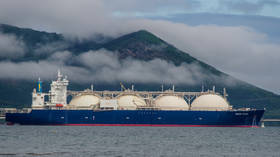
Russian energy continues to flow to the EU despite the bloc’s commitment to eliminating its dependence on it, a European Commission spokesperson has said.
She noted that the Commission plans to issue a roadmap in late February or mid-March aimed at completely ending Russian energy imports.
Last week, Politico reported, citing data tracked by commodities data provider Kpler, that imports by EU member states of Russian LNG have surged to an all-time high after they purchased 837,300 metric tons of the super-chilled gas in the first 15 days of this year.
Itkonen had also previously admitted that the EU’s Russian gas imports, particularly of LNG, increased in 2024.
Imports surged again shortly after Ukraine refused to extend a five-year transit contract with Russian energy giant Gazprom at the end of 2024, cutting off Romania, Poland, Hungary, Slovakia, Austria, Italy, and Moldova from piped natural gas from Russia.
Following the escalation of the Ukraine conflict in 2022 and the sabotage of the Nord Stream pipelines, the EU prioritized reducing its reliance on Russian energy. Some members voluntarily stopped importing Russian gas, while others kept doing so. Some countries also continued importing Russian LNG since the chilled fuel was only partially targeted by sanctions.
In June, the EU targeted Russian LNG for the first time, banning re-loading operations, ship-to-ship transfers, and ship-to-shore transfers with the purpose of re-exporting to third countries via the EU. The sanctions have a nine-month transition period.
According to data compiled by the Institute of Energy Economics and Financial Analysis, in the first half of 2024 Russia was the second-biggest supplier of LNG to the European continent after the US.
The loss of Russian gas could cost the EU over €1 trillion, according to Kirill Dmitriev, chief executive of the Russian Direct Investment Fund.
And where will that €1 trillion go? Mostly to America for LNG. Europeans are being played by America and are not bright enough to figure it out. Either that or they are being bribed to ignore what is good for their own country.
====================================================================
This small European country is defying the Western establishment: How long can it last?
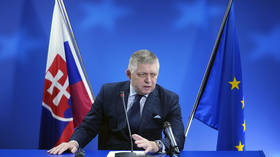
Slovakia, a small country tucked away in Eastern Europe, has always had limited logistical value to the West. This relative insignificance has, paradoxically, granted Bratislava a degree of freedom since the end of the Cold War. Yet, the political tides are shifting, and it appears Slovak Prime Minister Robert Fico’s visit to Moscow in December may become the pretext for his resignation under opposition pressure.
Opposition that most likely has some support from Brussels.
If a vote of no confidence is passed, it will signal the conclusion of yet another intriguing chapter in Slovakia’s unique post-Cold War story. For 30 years, this small nation has displayed surprising resistance to Western pressures and temptations. It will be fascinating to see how far the EU is willing to go in reasserting control over a country that, until recently, enjoyed some room for independent thought – particularly when Washington is preoccupied with its own domestic challenges.
Fico stands as a symbol of Slovakia’s freethinking spirit. A politician who survived an assassination attempt in May 2024, he repeatedly returns to power with slogans that challenge the prevailing narrative in Europe. His associates, like Andrej Danko, the deputy speaker of parliament, share this defiance. Danko’s open admiration for Russian consumer products during a recent visit to Moscow speaks volumes about Slovakia’s unorthodox political trajectory.
For much of Eastern Europe, the post-Cold War trajectory was preordained. Nations from Estonia to Bulgaria were absorbed into the Western fold, adapting their political and economic systems to serve as territorial bases for US strategic interests. These countries were not meant to act as a “cordon sanitaire” against Russia, as might have been the case in the early 20th century. Instead, their role was to provide maneuvering space in a future confrontation with Moscow – a function that required erasing any aspirations for independent political thought.
This reorganization suited most Eastern European societies. Many lacked a long tradition of statehood, their economies were fragile, and their histories of empire left them accustomed to living under external control. The allure of Western wealth and opportunity only reinforced their willingness to submit. Ambitious young elites, including many from national diasporas in the US and Canada, eagerly stepped in to facilitate this transition. These new leaders, disconnected from their countries’ national interests, became managers of a global American administration.
The infrastructure for this influence was comprehensive. American foundations and NGOs cultivated a new generation of politicians loyal to US interests. British intelligence played a supporting role, while Germany handled economic integration. France and other Western European countries took on the less glamorous tasks, ensuring the system’s continuity. Brussels bureaucrats and local security services enforced compliance, as seen in the removal of Lithuanian President Rolandas Paksas in the early 2000s when his loyalty to the West was questioned.
By the late 1990s, Eastern Europe had been purged of any capacity for independent political thought. Only those who demonstrated unwavering loyalty to the West could rise to power. In exchange, these elites gained virtual immunity from domestic accountability, even if their policies were inept.
Slovakia, however, has always been something of an exception. In the 1990s, under Prime Minister Vladimir Meciar, Bratislava resisted Western dictates more than its neighbors. Although Slovakia eventually joined NATO and the EU, its path was delayed and distinct. Meciar’s tenure earned him the moniker “Lukashenko on the Danube” in Western media, reflecting his defiance of Brussels’ norms. Economic reforms were implemented on Slovakia’s terms rather than under direct Western oversight, and relations with Russia remained warmer than Washington or Brussels deemed appropriate. Like Hungary, Slovakia’s small size and peripheral location have given it some leeway.
Times are changing, though, and what was tolerated a few years ago is increasingly unacceptable. The US and its European allies are doubling down on consolidating their influence wherever possible, especially as setbacks in places like Georgia and Ukraine raise doubts about the West’s ability to maintain its grip.
Fico’s recent challenges reflect this new reality. His political survival as a symbol of minimal freedom of expression in Slovakia is being tested, just as rumors swirl about potential challenges to his Hungarian counterpart, Viktor Orban. The EU establishment is keenly aware of these leaders’ defiance and is determined to curtail it.
Slovakia’s uniqueness lies in its relative autonomy from the harsher measures imposed on other Eastern European states. However, as Western powers seek to tighten their grip, Slovakia’s ability to resist may be nearing its limits.
The Americans, British, Germans, and other Western powers worked together for decades to align Eastern Europe with US strategic interests. The result has been a region largely devoid of independent political action, with NATO serving not only as a military alliance but also as a mechanism for internal stability. Slovakia’s continued defiance – however symbolic – challenges this system and underscores the limits of Western control.
The question now is whether Slovakia can continue to chart its own course in an increasingly rigid geopolitical landscape. The attacks on Fico and his associates suggest that the West’s patience is wearing thin. With Ukraine in turmoil and Georgia slipping from its grasp, the West’s focus on Slovakia may intensify.
Fico’s resilience, combined with Slovakia’s history of cautious independence, offers a glimmer of hope for those who value a multipolar world. But whether this small nation can withstand the growing pressure remains to be seen.

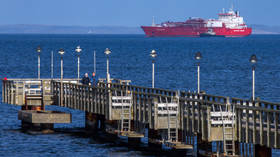
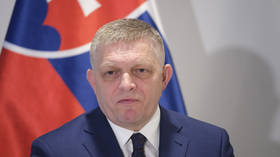
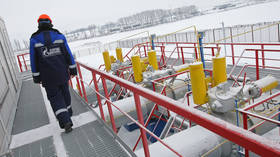

No comments:
Post a Comment